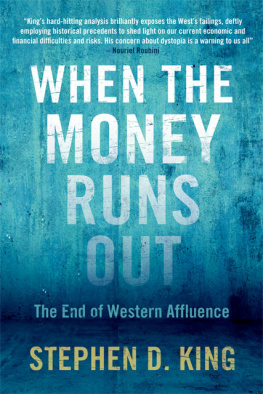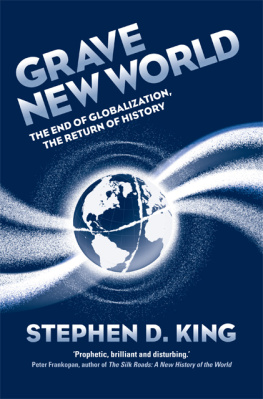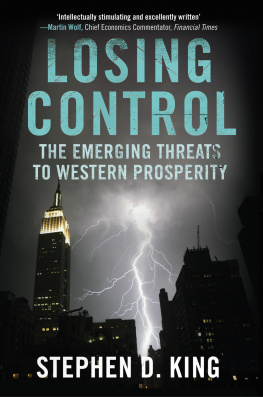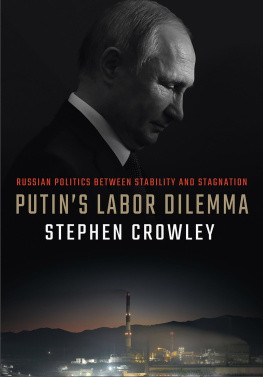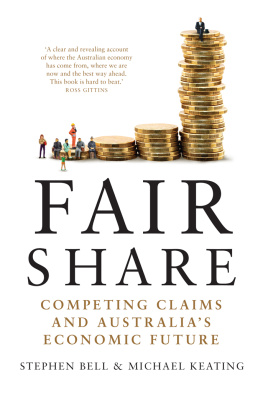

Copyright 2013 Stephen D. King
The right of Stephen D. King to be identified as author of this work has been asserted by him in accordance with the Copyright, Designs and Patents Act 1988.
All rights reserved. This book may not be reproduced in whole or in part, in any form (beyond that copying permitted by Sections 107 and 108 of the U.S. Copyright Law and except by reviewers for the public press) without written permission from the publishers.
For information about this and other Yale University Press publications, please contact:
U.S. Office:
Europe Office:
Set in Minion by IDSUK (DataConnection) Ltd
Printed in Great Britain by TJ International Ltd, Padstow, Cornwall
Library of Congress Control Number 2013935708
ISBN 978-0-300-19052-6
A catalogue record for this book is available from the British Library.
10 9 8 7 6 5 4 3 2 1
2017 2016 2015 2014 2013
CONTENTS
To Yvonne, Helena, Olivia and Sophie
ACKNOWLEDGEMENTS
Thanks must go first and foremost to those who provided detailed comments on the manuscript. I am particularly grateful to John Llewellyn, Peter Hennessy (or, to give him his full title, Baron Hennessy of Nympsfield), Chris Brown-Humes and Karen Ward for their extraordinary generosity in reading drafts of the entire book, in the process saving me from otherwise inevitable logical or factual embarrassment. Diane Coyle was a source of inspiration when the book was in its planning stages. Later, as she launched her own quest into the usefulness of economics, she encouraged me to think more deeply about the relationship between economics and history (her edited book What's the Use of Economics? is essential reading for anyone wondering how to rebuild the reputation of our profession).
Colleagues and friends have been important sources of support throughout. In particular, my conversations with David Bloom, Richard Cookson, William Keegan, Sir Richard Lambert, John Lipsky, Rachel Lomax, Gerard Lyons, Stephen Macklow-Smith, George Magnus, Robbie Millen, Peter Oppenheimer, Alec Russell and Anne Spackman have been inspiring and entertaining in equal measure. I have benefited from many hundreds of meetings with HSBC clients who have, at all times, kept me on my toes. I should also mention the dozens of policy-makers who have offered me candid views on the economic challenges ahead but who, perhaps, would prefer not to be named!
My economic thinking has been honed thanks to my involvement with fellow economists in a variety of different spheres, including regular meetings at the Bank for International Settlements in Basel, the Oesterreichische Kontrollbank AG (OeKB) in Vienna and the Accumulation Society in London. Although we have rather different views, I'm grateful to Richard Layard (Baron Layard of Highgate) for having invited me to join a panel debate on Stimulus versus Austerity at the Houses of Parliament, chaired by Evan Davis. The other members of the panel Paul Krugman, Jonathan Portes and Bridget Rosewell helped clarify some of the thinking contained in chapter 5.
As with my last book, I owe a huge debt of gratitude to Phoebe Clapham at Yale University Press, a truly brilliant editor who is never afraid to tell me when something just doesn't work. I am also, as ever, enormously grateful to Heather Nathan and Katie Harris.
At HSBC, Stuart Gulliver and Samir Assaf were, again, incredibly supportive of my book-writing ambitions, encouraging me to take time off to pursue my quest. I offer thanks to Stuart Parkinson and Michelle Nash for organizing my sabbatical with the minimum of fuss. Once again, my economics team has performed in exemplary fashion: special thanks go to Janet Henry and Madhur Jha, who contributed to an incredibly high standard of economic analysis in my absence. I also acknowledge the help and support of Pierre Goad, Charles Naylor, Jezz Farr, Lisa Baitup and Fiona McClymont. Nic Mason and Debbie Falcus have kept me sane throughout, while the superb University of Bath students have provided me with much-needed statistical assistance.
Finally, and most importantly, I am hugely grateful for the amazing support provided by my wonderful family. My wife, Yvonne, and my three daughters, Helena, Olivia and Sophie, have at all times offered understanding, patience and love. For my children's sake, I can only hope that the recommendations at the end of this book are heeded.
The best laid schemes o' Mice an' Men,
Gang aft agley,
An' lea'e us nought but grief an' pain,
For promis'd joy!
Robert Burns, To a Mouse (1785)
INTRODUCTION
WHATEVER HAPPENED TO THE DECADES OF PLENTY?
I count myself as one of the last of the so-called baby boomer generation. We were the lucky ones. Over the years, we enjoyed extraordinary increases in living standards. Born in 1963, I am sadly a bit too young to have experienced at first hand the Beatles, Jimi Hendrix and the Summer of Love but, economically, my birth couldn't have been better timed. In the first ten years of my life, per capita incomes in the United Kingdom adjusted for inflationary distortions rose around 37 per cent. By the time I reached my twenties, per capita incomes had risen a further 13 per cent. Over the following ten years, incomes went up another 29 per cent. And, as I settled down to celebrate my fortieth birthday, incomes had risen a further 36 per cent. All told, in the first four decades of my existence, per capita incomes in the UK almost tripled.
As I approach my fiftieth birthday, however, something seems to have gone horribly wrong. Over the last decade, per capita incomes in the UK have risen a mere 4 per cent. Other developed countries find themselves in more or less the same boat. Some, including
This is no ordinary period of economic setback. The recessions of my childhood and my early adulthood were extraordinarily painful affairs both for nations as a whole and, on a personal level, for my own family: in Thatcherism's darkest days, my father was unemployed for many months. Even during the deepest recessions, however, there was always the hope of subsequent recovery. Long-term economic growth was supposedly God-given. Recessions were merely annoying interruptions, blamed variously on policy-making incompetence, excessive union power, short-sighted financial institutions, lazy managers and nasty oil shocks.
Our modern era of economic stagnation is a fundamentally different proposition. Many of the factors that led to such scintillating rates of economic expansion in the Western world in earlier decades are no longer working their magic: the forces of globalization are in retreat, the boomers are ageing, women are thankfully better represented in the workforce, wages are being squeezed as competition from the emerging superpowers hots up and, as those superpowers demand a bigger share of the world's scarce resources, Westerners are forced to pay more for food and energy.
In the 1990s, it looked for a while as though new technologies might overcome these constraints. We hoped our economies would still be able to expand thanks to the impact of technology on productivity. The story didn't last. The technology bubble burst in 2000. Fearing the onset of a Japanese-style stagnation, Western policy-makers pulled out all the stops: interest rates plunged, taxes were cut and public spending was boosted. Yet, even before the onset of the subprime crisis in 2007, it looked as though these policies had led only to a serious misallocation of resources: too much money was pouring into housing and financial services (and, particularly across Europe, into public spending) and not enough into productive investment. The underlying rate of economic growth began to slow.
Next page
